Pretty cool right?
1. Research what kind of lizard is local. It's impressive to catch a lizard, but even cooler to know what it is. Shown above is a blue bellied/western fence lizard, or Sceloporus Occidentalis. 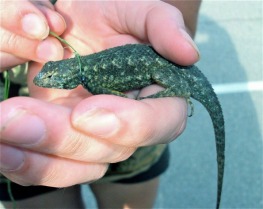
2. Go hiking. It's fun!
3. Pick a long piece of grass or bring unscented dental floss to tie to a stick. Here, I took the wheat off a a long strand of wheat grass.
4. Tie a noose in one end. Yes it's fine, it won't hurt Lizardo.
5. Keep your eye out for lizards. You may not find that many, but your company might point out a few.
6. Don't let him/her see you. It's important not to let your shadow get too close because shadows are the major way that they see. Also, of course, no sudden movements. With blue bellies, you're more likely to see a male. If they've seen you, they'll start doing pushups, but you can still try to catch them. They do push ups to show you that you shouldn't attack them because they're so macho.
7. Slowly slip the noose around his neck. Yes, he'll let you do it! This is because he's afraid of animals and people, not grass. even if the grass hits his face, he still won't care!
8. Yank the trap up quickly and then hold the lizard in your hand. Again, this won't break his neck or anything. Just pull him up kind of fast. He'll squirm, and with your other hand just hold his body.
9. Take off the trap. You can loosen it or break it.
10. Show all your friends. Now you can tell them what you've learned about this lizard! In the case of the blue belly, you can tell them about the parasites behind their cheeks, or look at the little turquoise scales they have.
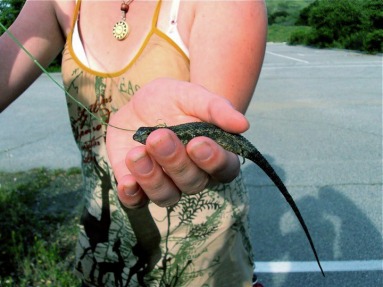 Photos by Shanna Renee'.
As a college student, I am often faced with many wonderful opportunities and choices. There are so many organizations that whoever has the right stuff can join, internships you can apply for, and scholarships you can get. Sometimes I feel that there are so many opportunities for us students, the hardest thing is deciding which ones to try.
Of course, that's not to say that there aren't stipulations for getting these opportunities. In order to ensure that you are an ideal candidate, you can attend seminars about success, read self-help books, and try to gain experience to make you a well-rounded and healthy person.
Though we're all far from perfect, personally I try to gain a lot of substance. I've gone to the career center to learn to exploit my strengths, and I've got communication skills coupled with an ability to keep a positive atmosphere when things are tough. I know how to give an interview, with enthusiasm and professionalism. The two most important characteristics an applicant can have to an employer are honesty and leadership skills, and I both value honesty and have experience with leadership classes. Not bad for a sophomore?
However there is one vital element that I lack, an element that cannot be taught in a seminar or learned in a book. This element has barred me from probably a good three-quarters of the scholarships and internships for which I have wished to apply. No, what I (along with so many others) am lacking is much more important than a positive attitude.
What I am talking about of course is the elusive dark skin.
How could I have missed that? I guess I am just not talented enough to apply for the American Academy of Science's Minority Science Writing Internship, nor can I get the Flip Wilson Journalism Scholarship. Sure I'm a journalism major with a passion for science and an ability to write a biography for Flip Wilson, but I just don't have enough of that golden melanin to be deserving.
So I encourage you pasty-faced losers, don't let this happen to you. Don't get so caught up in things like education and experience, because a true test of character is reflected in your complexion. Sure, you might get skin cancer before you're tan enough to be considered a minority, but it's worth the risk. Besides, us white people should be ashamed of the way we were born, anyway.
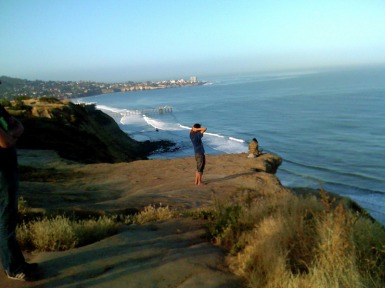 California student leaders gathered last weekend to discuss sustainability at an annual convergence held at the University of California, San Diego.
A group called the California Student Sustainability Coalition (CSSC) hosts both a spring and fall convergence each year at different California university campuses. Student leaders from across California interested in sustainability on campus and in their communities attended these convergences to learn the latest in environmental science and opinions, to share resources, and to socialize with other environmentalists.
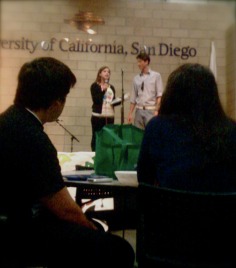 “It’s so great to come together with like-minded people and know you’re not in this struggle alone,” said Orange Coast College student Brianna Flores, who had come to the convergence after being alerted via the CSSC e-mail list. “Sometimes you feel like you’re taking on all these things, and just to come together with all these students who have done so much for their campuses, created such change…it’s really inspiring.”
The mission of the CSSC, according to their website, is “…to unite and empower California’s community of higher education to collaboratively and nonviolently transform our selves and our institutions based on our inherent social, economic, and ecological responsibilities.”
The students were told to arrive Friday night, where they socialized to get to know each other until that night, when many of them sprawled their sleeping bags across the floors of the dorms to sleep. On Saturday, the attendees went to three workshops of their choosing. Workshops, hosted by students, staff, and volunteer speakers, covered a broad range of topics, including traditional foods, how to advertise for a nonprofit organization using the Internet, the effects of meat on the environment, and home composting.
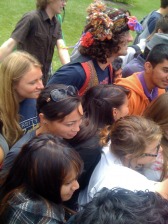 This semester, UC San Diego’s Student Sustainability Collective hosted the convergence, with convergence coordinator Jared Muscat, an involved member of the student sustainability community.
“It’s kind of our Mecca, you know?” said Muscat. “Every fall and every spring, it’s the one thing we come back to, we see each other if we haven’t seen each other for a while…we get super, super excited, and we just dive right in into all this stuff.”
The convergence provided free vegetarian, organic, local food for all the meals at the convergence, which had been donated by businesses around the campus as well as the campus farming co-op.
Later on Saturday night, there was a concert put on by a local band called The Skavolutionary Orchestra, to which the attendees enthusiastically danced.
Sunday morning, the attendees ate breakfast and attended one more workshop. The last event of the convergence was a spiral hug, in which the attendees all took each others’ hands and spun in a line to create a human spiral, which tightened into a massive group-hug.
Here are some heroes of ours who did some terrible stuff in their lifetime. Sure, there hearts might have been in the right place--it's pretty hard to live with your heart anywhere but in your chest--but it's interesting to know that these supposedly amazing people had some seriously devastating slip-ups due to their ignorance.
1. Mother Theresa
Here's one person that is so well known as a good person that her name is used synonymously as someone who sacrifices a lot to be kind. But, as a devout Catholic, she went around telling people not to use condoms and thus nearly created the momentum of the AIDS epidemic.
2. Ghandi
When Ghandi's first wife got sick, Ghandi had faith in God's power to heal. His dying wife begged for medication, but he refused to let her have it, saying that God would save her. As you may have guessed, she suffered through her illness and soon died. Later Ghandi got sick, and did not trust God would save him, and took the medicine.
3. Oprah
Oprah has done quite a bit in the means of donating to nonprofits and raising awareness. However, as the new owner of Discovery Health, she doesn't appear to know anything about medicine. She promotes "alternative medicine," such as homeopathy, which is literally nothing but water, as opposed to traditional western medicine. Multiple people, including children, have died from completely preventable illnesses, who decided (or whose parents decided) to skip real medicine and go with whatever quackery Oprah is pushing.
In some senses, you could argue that these individuals are, consequentially, murderers. You could argue that they were just not critical thinkers and unintentionally abusive of their powers. Either way, hero worship is dangerous if the worshipper can't tell that everyone makes mistakes. Also, these people illustrate the dangers of ignorance, and the idea that we should reject ideas that reject reality, no matter how much we want to believe them.
|


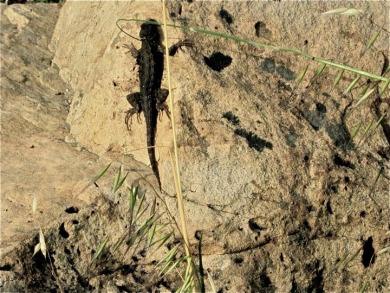



 RSS Feed
RSS Feed